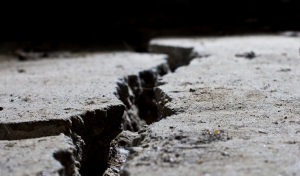 No one likes natural disasters. They can devastate entire areas and cause human suffering and death, leaving people to wonder why God would allow such calamities. If God created the earth for the benefit of humanity, why is it sometimes inhospitable to its inhabitants?
No one likes natural disasters. They can devastate entire areas and cause human suffering and death, leaving people to wonder why God would allow such calamities. If God created the earth for the benefit of humanity, why is it sometimes inhospitable to its inhabitants?
While a world without natural disasters might seem ideal, such events prove necessary for life on Earth to be possible. Without tectonic activity, the source of seismic activity, our planet would “possess no continents, no mountains, no stable water cycle, and nothing like the diversity and abundance of life we enjoy.” Plate tectonics helps to maintain the right levels of carbon dioxide in the earth’s atmosphere, without which life would be driven to extinction. If it weren’t for the just-right amount of plate tectonics, our planet would resemble our inhospitable-to-life neighbors, Mercury, Mars, and Venus.
While natural disasters (or what philosophers categorize as natural evil) are part of God’s creation, humanity often finds a way to frustrate an optimized feature of nature. That is, the impact of natural evil can be magnified by moral evil.
Biochemist Fazale Rana writes that, according to a recent study (and as one might expect), “more deaths occur in poverty-stricken parts of the world than in wealthy, developed countries.” However, the death tolls in some countries are higher (or lower) than expected based on the country’s income. This disparity, Fuz explains, correlates to the level of corruption—typically, with a ranking official benefitting financially—in those countries. In other words, “quake-related deaths stem from, in large measure, moral failings and could rightly be understood as an example of moral evil, not natural evil.”
Speaking of moral evil, it seems inevitable that as soon as a disaster strikes, some well-known alleged Christian spokesperson will assert that it’s God’s judgment on the morally evil. While God did use Noah’s Flood to judge the wicked, not every natural disaster is tantamount to God’s judgment. In Luke 13, the disciples ask Jesus about the persecution of the Galileans. Jesus answers,
In other words, stuff happens. Towers fall, volcanoes erupt, and the earth shakes. Though we might not appreciate or understand natural disasters, when they occur we can respond with confidence that they are part of God’s providential care for the creation. Should moral evil have played a factor in the damage, God is aware and concerned and will bring about a reckoning. Ultimately, he demonstrates compassion—often through other people—for those who have suffered loss as a result.
–Sandra
For more on natural disasters, see the following resources.
Articles
“Natural Evil or Moral Evil,” by Fazale Rana
“Designed to Shake,” by Hugh Ross
“Volcanism and Plate Tectonics on Earthlike Planets,” by Hugh Ross
“Why Do People Die in Earthquakes? Blame Corrupt Governments, Not God,” by Fazale Rana
“What If There Were No Hurricanes,” by David Rogstad
“Another Benefit for Life in Earthquakes,” by David Rogstad
“Grappling with Natural Evil,” by Fazale Rana
“Good God, Cruel World,” by Krista Bontrager
Podcasts
“Japan Tsunami and Natural Evil” (Straight Thinking podcast)
“How Could a Good God Allow Earthquakes?“ (Science News Flash podcast)
“Natural Disasters Also Demonstrate Fine-Tuning” (Science News Flash podcast)
Webpage
Video
“Natural Disasters,” with Jeff Zweerink and Kenneth Samples
February 8, 2013 at 3:35 am
[…] Why Would God Allow Natural Disasters? – One of the hardest parts of the problem of evil is the difficulty of “natural evils.” Check out this insightful response to the problem. […]
February 8, 2013 at 6:24 am
>such events prove necessary for life on Earth to be possible.
The key word here is ‘necessary’. For this argument to exonerate God, it must be the case that he could not have created a kinder world. Leibniz already proposed this. He said that since God is perfect as can be, he could only have created a world that was as perfect as possible. So, we must live in the best of all possible worlds. The problem here is that God becomes a bystander, unable to intervene because any change would reduce the perfection or our world.
If you find it plausible that an omnipotent God (meaning he can do any possible thing) could not reduce suffering at all, then you can believe. It’s a puzzle, because humans reduce suffering with Tylenol. If we can do it, it seems God could do it.
Even if God is working throuh humans, with his perfect knowledge, it seems impossible that he couldn’t have set things up so that one more child received Tylenol one second sooner, in at least one case. It is also hard to see how this small, additional bit of compassion would create greater suffering elsewhere that even God could not prevent.
It’s not impossible, though. The world could already have a minimum of natural suffering, and even God can’t do better. If that’s true, then he is constrained in a very precise way. It must be the case that in every instance of animal suffering (before humans even existed), he could not have quelled one more nerve impulse, or allowed the perfect rest of death to come a moment sooner.
He must be more constrained even than we are. He must be unable to give Tylenol to one more kid, one second sooner.